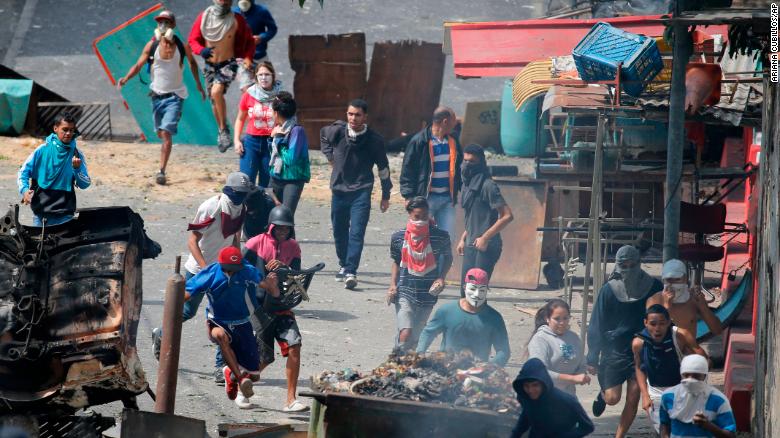Venezuelan government quashes military revolt
(CNN) Venezuela faced more turmoil on Monday when a small team of soldiers, claiming to be members of Venezuela’s armed forces, attempted an uprising against the government of President Nicolas Maduro and triggered violent street protests in Caracas.
A man who identified himself as Sgt. Wandres Figueroa led a small group of uniformed men to the special security unit headquarters at approximately 2:50 a.m. local (1:50 a.m. ET). The incursion was registered on cell phone and distributed via social media. In the videos, Figueroa speaks to the camera and calls on Venezuelans to take to the streets.
Small groups of demonstrators appeared on the narrow streets of the Cotiza neighborhood. The protests were contained with tear gas, according to a CNN team on the ground.
National Defense Minister Vladimir Padrino said the “small group of assailants” had been detained.
“The Bolivarian National Armed Forces categorically reject these types of acts, that with all certainty, are motivated by dark interests of the extreme right and are contrary to the elemental laws of military discipline, honor and traditions of our institution,” Padrino’s statement said.
The minister said the group stole two military vehicles and kidnapped four people and that the “full weight of the law” would apply to the individuals.
The events took place just days ahead of a national call for protests issued by the opposition-controlled National Assembly, which said it does not recognize Maduro’s second term and called for the leader to step down in order to clear the way for new elections.
Venezuela’s Supreme Court, which is stacked with Maduro loyalists, issued a ruling in Caracas on Monday stating that the National Assembly is invalid and that any agreement presented by the leadership of the legislative body after January 5 would be nullified.
Judge Juan Jose Mendoza, one of the leaders of the Constitutional Chamber of the Supreme Court, said, “Under no circumstance can the (Legislature) assume the actions of the executive office.”
On January 15, the National Assembly accused the Maduro government of “usurping power” and started drafting an amnesty law that would shelter any defecting member of the armed forces from rebelling against the government.
National Assembly President Juan Guaido tweeted that Monday’s events are a reflection “of the generalized feelings within the Armed Forces.”
“The National Assembly is committed to bring forward all the guarantees for those members of the Armed Forces who actively help restore the Constitution,” Guaido tweeted.
Several countries, including the United States, said they would not recognize Maduro’s second term. Three sources told CNN last week that US President Donald Trump was considering Guaido as the legitimate president of the country.
Maduro has continued the huge social welfare programs and price control policies of Hugo Chavez, who steered the country toward socialism before dying in 2013. Through nearly a decade of mismanagement, Venezuela squandered its profound oil wealth, leaving its economy in tatters and Latin America reeling from an unprecedented mass exodus of migrants in search of food and medicine.
CNN’s Flora Charner contributed to this report.
